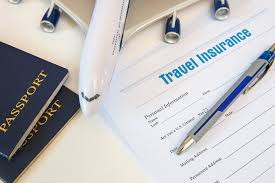
Traveling is one of life’s greatest joys, but it also comes with risks. Whether you’re heading out on a vacation, a business trip, or an adventurous excursion abroad, unexpected events can disrupt your travel plans. This is where travel insurance comes in.
Travel insurance provides a safety net that can protect you from various mishaps and unforeseen circumstances that could affect your journey, such as trip cancellations, medical emergencies, lost luggage, and even flight delays. With countless options available, choosing the right travel insurance can be overwhelming. In this detailed guide, we’ll explore what travel insurance is, why you need it, the different types of coverage it offers, and how to choose the right plan for your needs.
By the end of this blog, you’ll understand the importance of travel insurance and be equipped with the knowledge to make informed decisions when booking your next trip.
What is Travel Insurance?
Travel insurance is a type of insurance that covers the financial risks associated with travel. It offers protection against unforeseen incidents that might occur before or during your trip. From medical emergencies to trip cancellations, missed flights, or lost luggage, travel insurance helps mitigate the financial burden of these incidents, ensuring that your vacation, business trip, or adventure is as stress-free as possible.
There are many different types of travel insurance plans, with varying levels of coverage. Some policies may cover a wide range of situations, while others may be more limited in scope. You can often customize your plan to suit your travel needs, budget, and destination.
Why Do You Need Travel Insurance?
Travel insurance is not just for people going on long, international trips. Anyone traveling, even domestically, can benefit from the protection and peace of mind that a travel insurance policy provides. Here are some key reasons why travel insurance is essential:
1. Trip Cancellations and Interruptions
One of the most common reasons travelers buy insurance is to protect themselves from trip cancellations or interruptions. Life is unpredictable, and sometimes situations beyond your control may force you to cancel or shorten your trip. This can include:
- Sickness or injury: If you or a close family member falls ill or is injured before or during your trip, you may need to cancel or shorten your plans.
- Family emergencies: An unexpected death or serious illness in your family may require you to return home early.
- Weather or natural disasters: Severe weather or natural disasters like hurricanes, floods, or earthquakes can disrupt travel plans, forcing cancellations or delays.
With travel insurance, you can receive reimbursement for non-refundable trip costs such as flights, hotels, and tours, as well as any additional expenses incurred due to cancellations or interruptions.
2. Medical Emergencies Abroad
Medical emergencies can be extremely costly, especially when traveling internationally. Your regular health insurance may not cover you when you’re outside of your home country, or it may provide limited coverage for emergencies abroad. Travel insurance often includes medical coverage, ensuring that you have access to necessary treatment if you get sick or injured while traveling. Some benefits of medical coverage include:
- Emergency medical treatment: Coverage for hospital stays, surgeries, and emergency room visits.
- Medical evacuation: If you need to be transported to a hospital that can provide the appropriate care, emergency medical evacuation can be a lifesaver.
- Repatriation of remains: In the tragic event of a death while abroad, travel insurance can help with the costs of returning your remains to your home country.
Having medical coverage when traveling internationally provides much-needed peace of mind and ensures that you’re prepared for any health-related emergencies.
3. Lost or Delayed Luggage
There’s nothing more frustrating than arriving at your destination only to find out that your luggage is missing or delayed. Travel insurance can offer protection for lost or delayed baggage by covering the cost of replacing essential items like clothing, toiletries, and other necessities while you wait for your luggage to arrive. Some policies even cover lost baggage, reimbursing you for the cost of replacing your belongings.
4. Flight Delays or Missed Connections
Delays are a common occurrence in air travel. Weather conditions, mechanical issues, or air traffic control problems can cause flight delays or cancellations, which may lead to missed connections. Travel insurance often includes coverage for:
- Accommodation: If you miss a connecting flight due to a delay, insurance can cover the cost of overnight accommodation.
- Meals and transportation: Coverage for meals and local transportation during a long delay.
- Reimbursement for lost expenses: If you miss your flight and have to rebook, travel insurance may reimburse you for additional costs that you incur, such as extra flight charges.
These benefits can save you from having to pay out-of-pocket for unforeseen travel disruptions.
5. Protection Against Theft or Loss
Theft is unfortunately a risk when traveling, whether it’s your wallet, passport, or valuable belongings. If your belongings are stolen while traveling, travel insurance can help with the costs of replacing lost or stolen items, including:
- Personal items: Protection for stolen electronics, cameras, clothing, or luggage.
- Travel documents: Coverage for lost passports, visas, or other important documents, including help with emergency replacement.
This type of coverage can alleviate the stress of dealing with theft while traveling and provide financial assistance for replacing what you’ve lost.
6. Peace of Mind
Ultimately, the primary benefit of travel insurance is peace of mind. Travel is often filled with uncertainties, and knowing that you’re financially protected against unforeseen events can reduce anxiety and stress. Whether you’re booking a solo adventure, a honeymoon, or a family vacation, travel insurance ensures that you can handle any bumps in the road with ease.
Types of Travel Insurance Coverage
Travel insurance policies vary significantly in terms of coverage and cost. Understanding the different types of travel insurance and the specific coverage they provide will help you choose the right plan for your trip. Here are the most common types of travel insurance:
1. Trip Cancellation Insurance
This type of insurance protects you in the event that you need to cancel your trip for covered reasons. Coverage typically includes reimbursement for non-refundable trip costs such as airfare, hotel accommodations, and tours. Common reasons for cancellation that are covered include:
- Sudden illness or injury to you or a family member
- Death of a family member or close relative
- Natural disasters or severe weather that disrupt travel
- Terrorist attacks or civil unrest at your destination
Be sure to check the policy to see if it covers “cancel for any reason” (CFAR), which gives you more flexibility in cancelling your trip, even if the reason is not covered by standard trip cancellation insurance.
2. Trip Interruption Insurance
Trip interruption insurance covers the costs if you need to cut your trip short due to an unforeseen event. This can include things like:
- Medical emergencies that require you to return home
- Family emergencies or sudden death
- Natural disasters or civil unrest that prevent you from continuing your trip
Trip interruption insurance can reimburse you for the unused portion of your trip, including hotels, activities, and flights that you’ve paid for but couldn’t take advantage of.
3. Medical Travel Insurance
Medical travel insurance provides coverage for medical expenses incurred while traveling abroad, such as:
- Emergency medical treatment for illnesses and injuries
- Hospital stays, surgeries, and doctor visits
- Emergency medical evacuation or repatriation of remains
Medical insurance is particularly important for international travelers, as health care costs can vary greatly from country to country, and your domestic insurance may not cover you abroad.
4. Baggage Loss and Delay Insurance
Baggage coverage helps protect you against the loss, theft, or delay of your luggage while traveling. This may include:
- Reimbursement for lost or stolen luggage
- Compensation for items delayed in transit (e.g., clothing, toiletries, and essential items while waiting for your bags)
It’s always wise to add baggage insurance to your policy, especially if you’re carrying valuable or important items.
5. Flight Delay or Missed Connection Insurance
Flight delay insurance can help cover expenses incurred due to a flight delay or missed connection, such as:
- Hotel accommodations and meals during long delays
- Additional transportation costs or rebooking fees
- Other unforeseen expenses caused by a missed connection or cancelled flight
If your flight is delayed or you miss a connection, this coverage can minimize your out-of-pocket costs.
6. Travel Accident Insurance
This coverage protects you in case of accidents during your trip. It typically provides a lump-sum benefit if you are injured, disabled, or killed while traveling. Travel accident insurance can help cover medical expenses or provide compensation for long-term disability.
7. Cancel for Any Reason (CFAR) Insurance
As the name suggests, this add-on allows you to cancel your trip for any reason, not just the reasons covered by standard trip cancellation policies. While this coverage is more expensive, it can offer flexibility if your plans change unexpectedly.
How to Choose the Right Travel Insurance Plan
Choosing the right travel insurance depends on your travel plans, the nature of your trip, and your individual needs. Here are some factors to consider when selecting a travel insurance plan:
1. Destination and Length of Travel
The destination of your trip can influence the type of insurance coverage you need. If you’re traveling internationally, you may require more comprehensive coverage, including medical insurance and emergency evacuation. Similarly, if you’re traveling for an extended period, such as several weeks or months, a more robust policy may be needed.
2. Trip Costs and Non-Refundable Expenses
If you’ve booked a trip with significant non-refundable costs, like expensive airfare or tours, trip cancellation and interruption insurance is especially important. Review your trip expenses and decide if the cost of insurance is worth protecting your investment.

